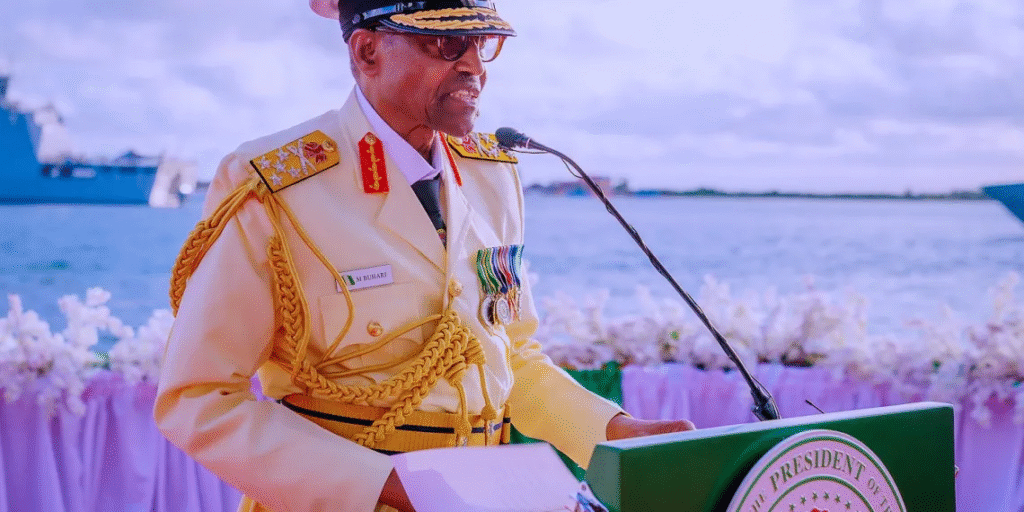Features
Beyond Politics: The Business Reforms That Defined Buhari’s Presidency

From sweeping anti-corruption drives to ambitious infrastructure investments and agricultural transformation, Buhari’s presidency redrew Nigeria’s economic blueprint — but not without hurdles.
As the nation bids farewell to former President Muhammadu Buhari, who passed away in London at the age of 82, Nigeria’s business community reflects on a presidency that redefined economic governance through structural reforms, aggressive anti-corruption campaigns, and a push for self-sufficiency in key sectors.
Buhari, who led Nigeria from 2015 to 2023, left behind a complicated but impactful economic legacy. While he entered office amidst a crash in global oil prices and mounting public debt, his administration prioritized transparency, infrastructure development, and the revival of local production — setting a tone that continues to shape policy under his successor.
Taming the Leakages: Anti-Corruption as Economic Strategy
One of Buhari’s first acts as president was the enforcement of the Treasury Single Account (TSA), aimed at consolidating government revenue and curbing fiscal leakages. Under his leadership, the TSA and the Integrated Payroll and Personnel Information System (IPPIS) became key tools in removing ghost workers and sanitizing public finances.
Billions of naira were reportedly saved or recovered through the Economic and Financial Crimes Commission (EFCC) and other anti-graft agencies. For private sector players, this shift sent a strong signal — Nigeria was, at least nominally, serious about improving its business environment.
Infrastructure Ambitions: Laying the Groundwork
From roads and rails to power and ports, Buhari’s government initiated or completed a wave of infrastructure projects with the goal of unlocking Nigeria’s growth potential.
Key among them were the Second Niger Bridge, the Lagos–Ibadan Standard Gauge Railway, the Abuja–Kaduna rail line, and over 13,000 kilometers of road construction and rehabilitation nationwide. These projects, although delayed in some cases, attracted significant foreign and local investment, particularly from China and development finance institutions.
In the energy sector, Buhari championed the Siemens Electrification Roadmap, a multi-phase plan aimed at stabilizing Nigeria’s power grid and expanding electricity access.
Agriculture and the Local Economy: A Pivot Toward Self-Reliance
Faced with rising food import bills and foreign exchange pressures, Buhari’s administration launched the Anchor Borrowers’ Programme and the Presidential Fertilizer Initiative. These schemes provided credit and inputs to farmers while seeking to reduce Nigeria’s reliance on imports for staples like rice and wheat.
According to the Central Bank of Nigeria, rice importation fell by over 80% during Buhari’s tenure, while local production surged, creating millions of agro-based jobs. Despite concerns over inflation and food security, this pivot marked one of the clearest shifts toward economic nationalism.

Currency Crisis and FX Management: A Double-Edged Sword
Buhari’s economic policies weren’t without their critics. The decision to maintain an artificial exchange rate for years, coupled with strict FX controls, discouraged foreign investment and created a thriving parallel market.
Multiple devaluations of the naira and policy inconsistencies led to capital flight in some quarters. For businesses, particularly import-dependent manufacturers, this period was marked by volatility, limited access to forex, and rising production costs.
Still, the Central Bank’s interventions, including import substitution policies and the restriction of forex for non-essential goods, aligned with Buhari’s broader push for economic self-reliance.
Oil, Gas, and Fiscal Federalism: A Missed Opportunity?
Though Nigeria remains heavily dependent on oil, Buhari’s tenure saw some long-awaited milestones — notably the passage of the Petroleum Industry Act (PIA) in 2021, after nearly two decades in legislative limbo.
The PIA aimed to create transparency in the sector, restructure the NNPC into a profit-driven corporation, and provide clearer fiscal terms to investors. However, the implementation lag and persistent insecurity in oil-producing regions prevented Nigeria from fully reaping the benefits of the reforms.
Revenue from oil exports fluctuated throughout Buhari’s administration, with subsidy regimes and opaque accounting practices continuing to strain public finances until their eventual removal in his final year in office.
Legacy of Business Reforms and Institutional Resilience
Despite a recession in 2016 and another in 2020 due to the COVID-19 pandemic, Nigeria under Buhari maintained relative macroeconomic stability. The establishment of the Presidential Enabling Business Environment Council (PEBEC) was an effort to improve Nigeria’s ease of doing business rankings, leading to the digitization of company registration and streamlining of port procedures.
His presidency also laid the groundwork for key regional trade initiatives like the African Continental Free Trade Area (AfCFTA), positioning Nigeria as a central player in intra-African commerce
For Nigeria’s business ecosystem, Muhammadu Buhari’s economic stewardship offers a tale of two halves: one of hard-fought reform and long-term vision, and another constrained by structural rigidity, FX instability, and slow policy execution.
Yet, even his critics concede that Buhari’s presidency marked a turning point in how Nigeria thinks about economic governance — not just in terms of profit, but in purpose.
As the nation mourns, the business community will remember him not only as a president, but as an architect of institutional shifts that could shape the Nigerian economy for decades to come.



